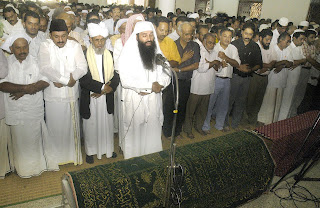Kamala Suraiya lived a great life, and her death was greater still.
Thousands participated in the funeral of the great writer at the Palayam Juma Masjid, in Thiruvananthapuram on Tuesday, 2nd June. Imam Moulavi Jamaludheen Mankada led the prayer. Prominent leaders of all walks of life were present.
Her body was brought to Palayam in the early hours of the day. Her daughters-in-law Lakshmi and Devi too joined in everything along with the Muslim women. Her grieving daughters-in-law along with their children whole heartedly witnessed the namaz offered by women. The body was taken to the Masjid at 8.15 AM, amidst the heavy crowd that was pouring in. Kamala Suraiya’s sons M.D. Nalappattu, Chinnan Das and Jayasurya were present in the forefront, along with family-friend Murukan. As the Imam commenced the Janazah Prayer, they joined the thousands in the plea to the Almighty, for the salvation of the deceased.
Sons and in-laws received the body at the graveyard too. Kerala’s literary, cultural and political leaders were present along with several pominent religious leaders. After the body was placed in the grave, eldest son, Nalappatt threw a handful of sand over it, as the crowd followed suit.
People continued offering handfuls of sand as well as flowers as per they wished. And it went on for a very long time.
Nalappatt later welcomed the approach of the Muslim community. He said that they had thought that they would have to leave their mother to Muslims. But, all fears became baseless within five minutes of entering the Palayam Juma Masjid. They were the ones who did everything along with the Muslims. Even though taking part in all the funeral activities for the first time, Nalappatt says he never felt any strangeness. More than everything else, what happened in the Palayam Masjid on Tuesday did really open the eyes of many people. It has given a great message to Kerala, he added.
Kamala Surayya left this world on 31st May in Pune. Her body was then brought to Kerala. It was taken to Thrisur, Kochi, Alappuzha and Kollam before reaching Thiruvananthapuram. On Monday night, it was kept at the V.J.T. Hall in Thiruvananthapuram for the public to see. Friends and fans alike crowded to have a last glimpse of dear Aamy. Chief Minister V.S. Achuthanandan also came to pay his last respects to the great poetess.

